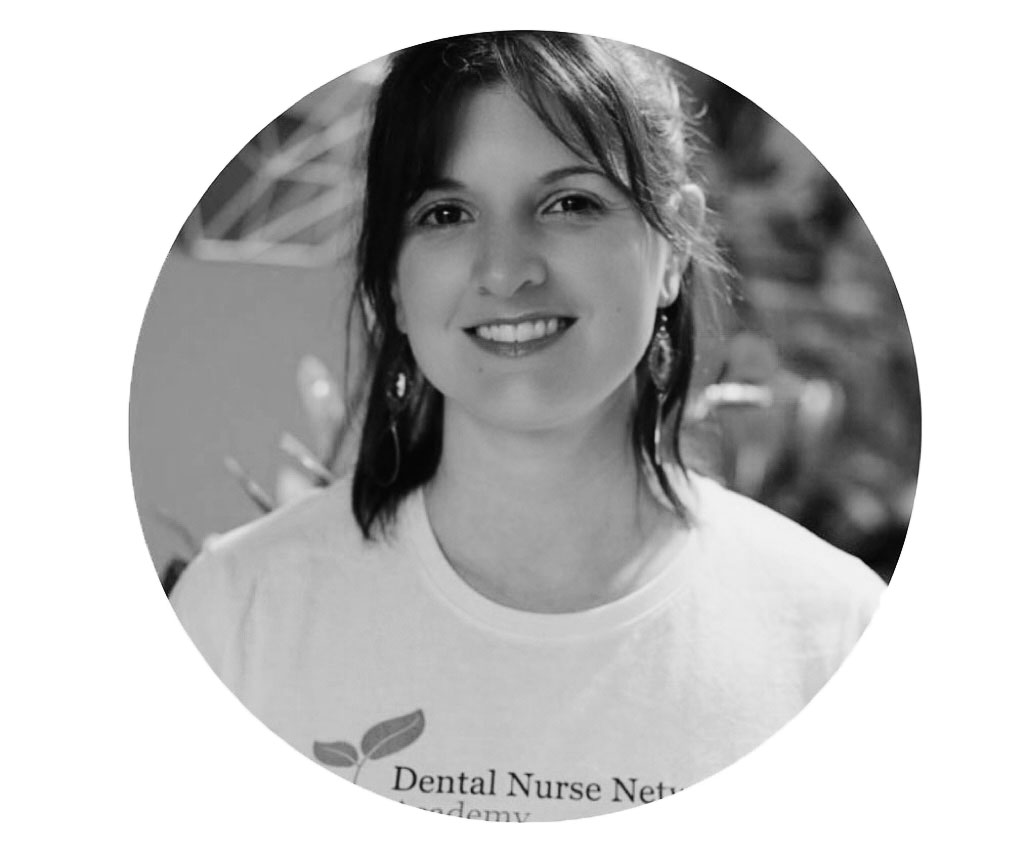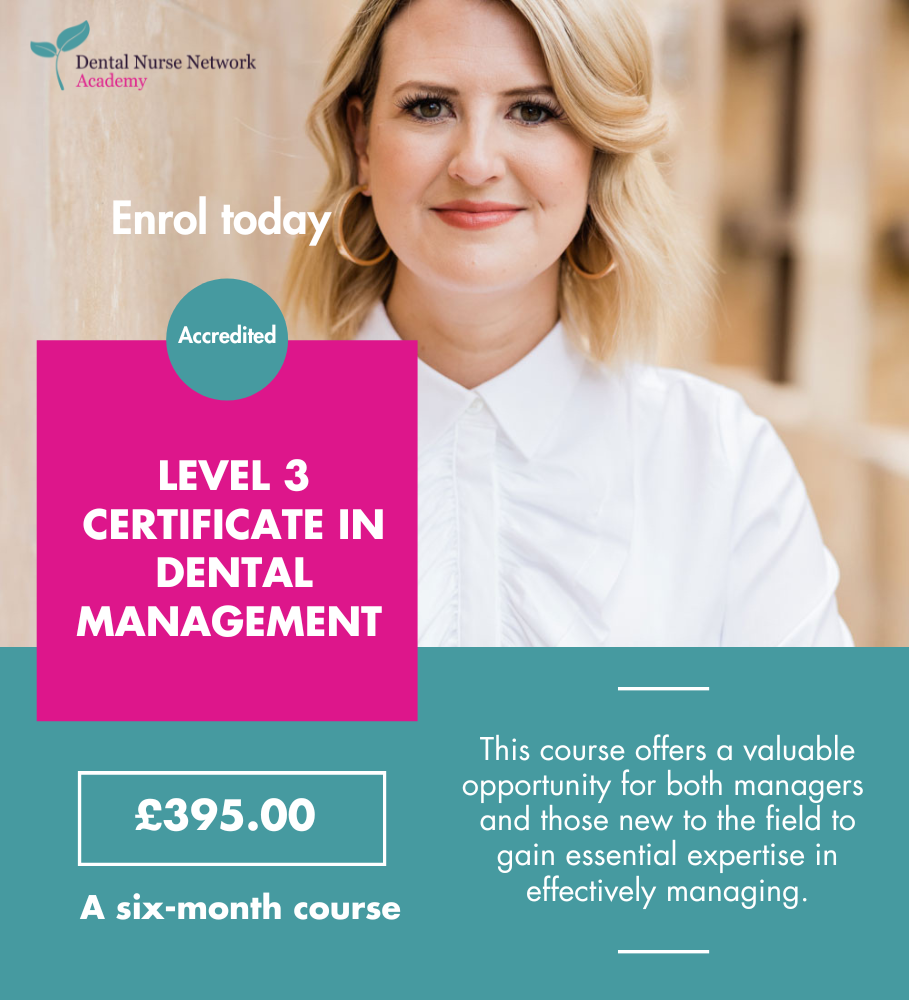Course Overview

This accredited, award-winning course is for head dental nurses or dental nurses transitioning into leadership roles within their practice. It provides comprehensive Level 3 training in leadership, managing the clinical environment, effectively leading and motivating a team of dental nurses, and developing professionalism within the dental team. This course will ensure you are a knowledgeable, confident, and competent head dental nurse. Course Brochure
FAST-TRACK AVAILABLE EXCELLENT LEARNER SUPPORT ACCREDITED TRAINING
Benefits
Flexible Completion Time: Learners have up to six months to complete the course, but fast-track completion is available within one month.
Flexible Learning Schedules: Adapt the course to fit your personal and professional commitments.
Comprehensive Online Tutorials: Access detailed and engaging tutorials to guide your learning.
Outstanding Support: Benefit from easily accessible and exceptional support throughout your learning journey.
Accreditation: Level 3 Accredited Certificate in Lead Dental Nursing upon successful completion.
Structure
Course Summary
Format: online, self-paced
Average completion time: 4 months
Number of Learning Units: 18
CPD Hours: 24 hours
Guided Learning Hours: Average of 50 hours (depending on the learner's speed)
Course Assessments
Unit Quiz: One multiple choice quiz per unit
Final Assessment: Includes a case scenario and a reflective question
Support
Optional drop-in support session classes available.
One-to-one tutor support is easily accessible by email, telephone, or Zoom.
Modules/Units
Module 1: Caring for the dental team
- Unit 1: Communication skills
- Unit 2: Stress and time management
- Unit 3: Inductions to the team
- Unit 4: Mentorship and team development
Module 2: Management skills for lead dental nurses
- Unit 1: Planning team meetings
- Unit 2: Planning rotas and work allocation/delegation
- Unit 3: Motivating the team
- Unit 4: Conflict resolution and problem solving
Module 3: Professionalism, and legal and ethical Issues
Module 3 is based on UK dental regulations. Unit 6 is based on the CQC for England.
- Unit 1: GDC Standards for the Dental Team
- Unit 2: Regulations, accountability and responsibility
- Unit 3: Record-keeping and consent
- Unit 4: Safeguarding Level 1 & Level 2
- Unit 5: Whistleblowing
- Unit 6: Care Quality Commission (CQC)
Module 4: Clinical and practical skills
- Unit 1: Managing the clinical environment
- Unit 2: Stock control and ordering
- Unit 3: Surgery folders
- Unit 4: Audits
Tutors
 Meet Your Tutor: Stephanie Carter
Meet Your Tutor: Stephanie Carter
Why learn from Stephanie?
Stephanie Carter brings a unique blend of experience, knowledge, and dedication to her role as a course instructor. Here’s why you’ll benefit from her expertise:
Extensive Experience: Over 18 years in the dental industry.
Leadership and Management Expertise: Holds a Level 7 Diploma in Strategic Leadership and Management.
Educational Excellence: Holds a Level 5 Diploma in Education.
Key Qualifications:
Dental Hygienist and Therapist
Dental Nurse
Level 4 Quality Assurance
Level 3 Assessor
Diploma in Mentorship and Coaching
Professional Affiliations:
Member of the Faculty of Dental Trainers, Edinburgh: The faculty promotes the role of the dental trainer, recognises achievement and excellence, and ultimately enhances the quality of patient care.
Stephanie’s dedication to personal and professional growth ensures that you will receive a comprehensive and profoundly insightful learning experience.
Course Assessors
The role of the assessor is to your mark your assessments and give you feedback.

Hilary Urry
Registered Dental Nurse
Level 3 in Dental Nurse Leadership
Qualified Tutor and Assessor

Stefan Booyens
Registered Dental Nurse
Level 3 in Dental Nurse Leadership
Qualified Assessor
Dates
Next available enrolment dates:
Monday 23 February 2026 - Available
Monday 23 March 2026 - Available
Payment Options
Payment Plans
We now offer the option to pay over five payments. Please be aware, this increases the fee to £410.00 inc. VAT.
Payment due dates:
- 23 February 2026 £140.00 (Non-refundable deposit)
- 23 March 2026 £140.00
- 23 April 2026 £140.00
We will NOT send reminders of payment due dates. Failure to make payment by the due dates will result in automatic removal from the course.
Please note, your certificate of competence will not be awarded until full payment is made.
Please note that discounts are applied to the VAT-exclusive fee. Discounts cannot be applied to payment plans.
Multiple applicant discounts
- Two applicants: 5% discount
- Three applicants: 10% discount
- Four or more applicants: 15% discount
Multiple course discounts
- Two courses: 5% discount
- Three courses: 10% discount
- Four or more courses: 15% discount
Please apply by telephone or use the application form here. DNN will send you an invoice.

